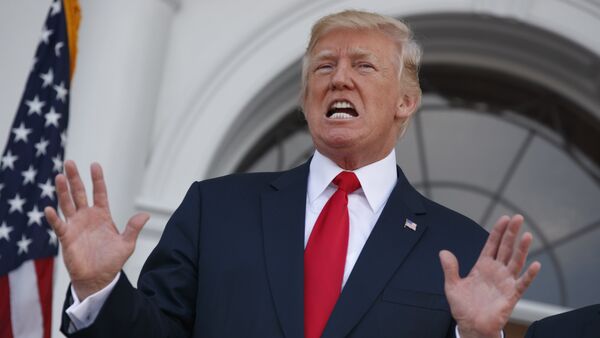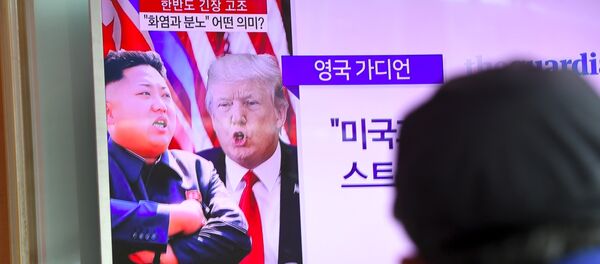North Korea’s state news agency reported on Monday that the country’s leader Kim Jong Un had been briefed on the planned test firing to a target area near Guam. However, the following day the North Korean leader expressed hope the United States undertakes the right decision to diminish tensions on the Korean peninsula.
US, NORTH KOREA WANT TO AVOID SHOOT OUT
Analysts said Kim’s comment fitted into his pattern, inherited from his father before him, of making outrageous threats, but also seeking to avoid getting caught in situations that might rapidly escalate into any kind of full-scale war.
On Friday, Trump tweeted that US military forces were "fully in place, locked and loaded" for an attack on North Korea.
Also on Friday, at least one Defense Department official told the media that no such redeployment of forces had actually taken place.
The war of words between Trump and Kim did not mean that the United States was looking for a pretext for war with Pyongyang, US-Korea Institute Assistant Director Jenny Town said.
"I think there’s a lot of rhetoric going back and forth, but I don’t think either side really believes that the other side is ready for real actions," Town stated. "It’s definitely a war of words."
Both the United States and North Korea were reiterating messages they had repeatedly sent each other in the past, Town said.
"This is dramatic as possible, but I don’t necessarily think that either side is ready to pull the trigger," she said.
However, the current tone of messages from both the US and North Korean capitals was not conducive to reducing tensions, Town cautioned.
"What both of them are saying… and [the latest] tweet from Trump, it’s a strong message, like all options are on the table. And this is not best way to do it. And certainty, this message has been said before," Town said.
Trump‘s controversial tweets did not set US policy toward North Korea and the rest of the world needed to realize that, Town pointed out.
"People just need to take a deep breath and not overreact to Trump’s tweets and focus on what are the messages that are coming out of his administration," she said.
Town acknowledged that US policy toward North Korea at times could appear confused and contradictory.
The policy-making institutions of the US government remained responsible and predictable in dealing with the crisis, Town noed.
"If we look towards the most functional aspect of the administration and not Trump twitter account, I think this will give us a better idea of what America is really doing," she said.
Trump and his administration were making a mistake in relying increasingly on sheer military power and the threat of using direct brute force in their dealings with North Korea when they should have been seeking to engage Pyongyang diplomatically and culturally, Town advised.
"There seems to be, under this administration, [a] shift away from our soft power ideological leadership. And now trying to revert back to Cold War, hard-power, with ‘We’re strong, if our military is strong.’ I think that’s a huge mistake," she said.
Current US leaders had a narrow, constricted view of how diplomacy operated and saw it only as an adjunct to the threat of using military force, Town warned.
"There’s always room for diplomacy, but it takes greater political will to get there, and the problem is that we’ve been using diplomacy as sort of a reward for good behavior which makes it very difficult to enter into a negotiation process. But we need to stop doing that," she said.
The intelligent, creative use of diplomacy needed to become the basis of US strategy on dealing with North Korea rather than just serving to promote military objectives, Town recommended.
"We need to start using negotiations in order to get what we want, in order to meet our objective," she said.
However, Town admitted that with tensions high, there was a danger of miscalculation that could lead to serious consequences.
"The biggest problem right now is that tensions are so high and the war of words is escalating, it does really heighten the risk for miscalculation and misperception," she said.
Trump also faced the problem that he was committing US credibility directly in the confrontation with North Korea, Town admitted.
"It’s also a test for US credibility in this as well, as he’s drawn some red lines. If he doesn’t follow up on those, what does that mean? It also worries our allies. We see signs out of Tokyo or Seoul, that there’re trying to call for more restraint, trying to call for more coordination," she said.
Independent Institute Center for Peace and Freedom Director Ivan Eland agreed that Trump’s personal rhetoric had further escalated tensions and made an already serious situation worse.
"Trump's overheated rhetoric… is dangerous because of possible miscalculation and because it could needlessly box him in by setting a red line that has already been violated, and is counterproductive because it makes an already paranoid regime more nervous," Eland said.
The top US diplomatic and military officials were all seeking to defuse tensions, Eland observed.
"Secretary Tillerson and Generals Dunford, [Secretary of Defense James] Mattis, and [National Security Adviser Harold] McMaster are now trying to clean up after the elephant at the circus, attempting to calm things down," he said.
Any outbreak of war on the Korean peninsula was irrational and would be costly and disastrous for all sides, Eland concluded.





